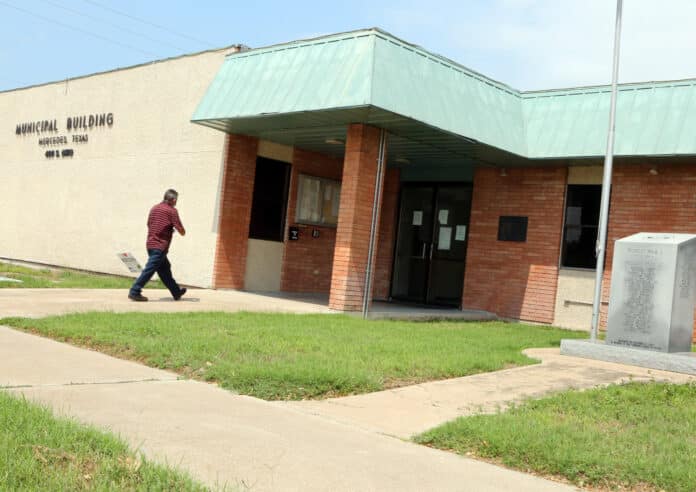
MERCEDES — After several tumultuous years with city finances in disarray, things are looking up in the Queen City — so much so that S&P Global Ratings, the Manhattan-based credit rating agency, has affirmed the city’s A+ rating.
The rating indicates S&P’s confidence that Mercedes is well-positioned to meet its debt obligations. But it also reflects the city’s efforts to right serious, longstanding issues in balancing its books — namely, in how Mercedes has spent years, and millions of dollars, subsidizing its utility fund.
“The general fund was subsidizing it to up to the tune of $800,000 a year,” Mercedes City Manager Alberto Perez said.
Typically, utility services — like water and wastewater treatment — are money-making operations. Their operating expenses, such as the cost of chemicals used to clean water and effluent, are paid for via the fees a municipality charges to provide the service.
However, that hasn’t been the case in Mercedes.
For years, the city had been infusing the utility fund with the property and sales tax revenues that would normally go toward paying for the city’s regular operating expenses, such as staff payroll and street repairs.
“There’s $3 million-plus out there… that the utility fund owes the general fund,” Perez said.
The utility fund’s insolvency was such a glaring concern that it drew the attention of S&P when the credit rater re-evaluated Mercedes’ creditworthiness last spring.
“The general fund has supported the utilities with cash infusions for years, which resulted in a large receivable in the general fund, standing at $3.7 million at fiscal year-end 2020,” S&P stated as part of a report that Perez presented to the Mercedes City Commission this week.
The credit rater even went as far as questioning city officials over media reports of its financial struggles.
“While some of them may have been somewhat true, some of them were exaggerated. … And so, Standard and Poor’s looked at newspaper articles that we had to respond to because they had solid questions…” Perez explained to the commission on Tuesday.
At the time that S&P was evaluating the city, Mercedes had already begun to take steps to correct the financial imbalance.
Perez said he began investigating the utility department’s woes as soon as he was appointed city manager.
First, he ruled out issues such as water loss rates. Then, he winnowed in on the exorbitant fees the city was paying a third party for sludge removal.
“The sludge cost almost $800,000 a year,” Perez said, adding that that figure was high for a city Mercedes’ size.
Perez halved that cost to about $400,000, but it still wasn’t enough to right the ship.
The need to increase revenue generation ultimately led Mercedes to charging its residents more for their water and sewer service.
First, a split city commission approved a 22% rate increase to residents’ water bills in August 2021. Then, last summer, the commission approved additional rate increases to be implemented over a five-year timeframe.
The newer rate increases were meant to bring parity between commercial and residential users, who had been paying disproportionately higher rates based on consumption, according to the results of a rate study Mercedes commissioned last year.
Since last March, when S&P spent two weeks evaluating Mercedes’ finances, the city has succeeded in making the utility fund self-sufficient. That day came in August, Perez said.
By Sept. 30, 2022 — the end of the fiscal year — the utility fund had created a $600,000 surplus.
But both S&P and Perez cautioned city leaders that the story isn’t over yet.
S&P’s report makes clear that the credit rater could downgrade Mercedes’ rating if the city doesn’t sustain its efforts to balance its finances.
“The support has strained the general fund although reserves remain at very strong levels. However, any further deficits and a deterioration in general fund balance will likely negatively affect the rating,” the S&P report stated.
Perez was even more succinct.
“This is not always over once they come through and are gone. … They continue to monitor us,” he said.




